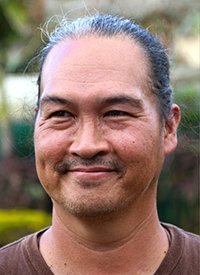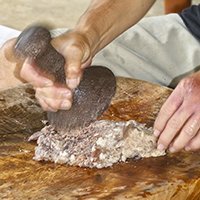Poi pounding flavors our hula event
The PCC’s Hawaiian Village routinely offers visitors the opportunity to sample poi, or even try their hand at pounding boiled taro into the famous Hawaiian staple food; but during the 26th annual Moanikeala festival this year a Hawaiian man who virtually grew up in the village shared a special poi pounding opportunity.

As a young boy, Lono Logan was featured in thousands of early PCC pictures when his grandparents, Jubilee and Eugenia Logan, served as the first leaders in the village. “I was looked after by my grandparents. I grew up running around there,” said Logan, who often wore a Hawaiian malo [a short wrap-around] back then. “This was kind of like our second home.”
“I’ve always had an interest, and remember watching my grandmother pounding poi at home and at the PCC,” Logan recalls. “The earliest memory I have of her showing me how, I was about three years old in the original Hawaiian Village [where the Hawaii Mission Complex now is]. In the back there was a hut. She had the lauhala mat on the floor, and she had
a second batch of taro boiling, and I was doing something under the table.”
“As she started pounding that batch, she said, ‘Sonny, come here.’ She sat me down next next to the board, then she sat behind me and put my hands on the pohaku [stone poi pounder], with her hands on my hands. I remember pounding a little bit.”
Flash forward about 36 years later: Logan and his wife, Anna Poa Logan, a New Zealand Maori, were visiting family and friends in her native North Island when he experienced what some might call a poi epiphany:
“I used to ask people there, where’s the taro, and everybody said it was too cold there to grow. That’s a believable answer, but I know that our ancestors took kalo with them to Aotearoa, because it was our staple food.”
One day he recalls going in back of a friend’s house in the Mauganui area, and I couldn’t believe it — there were bunches of taro. That right there was the beginning for me. Something hit me. All of a sudden I had this desire — this feeling inside me to do more with poi.” Hawaiians call such a sense of responsibility or commitment kuleana.
“I want to clear misconceptions about what poi is, and about poi pounding. I saw my grandparents kind of doing the same thing I’m doing. That’s where I get kind of teary-eyed, because in one sense I never thought I would be on this ‘journey’; but I’m very much enjoying it. I just love it.”

Logan said he’s still researching and learning, but now he takes opportunities like the Moanikeala Festival at the PCC to share his insights and fresh pa’i’ai — the first stage of pounded kalo, which is more dense and solid than the more diluted poi. He also sometimes shares his pa’i’ai with kūpuna or elders in the community, some of whom knew his grandparents.
“When I go through this community, and people tell me how much impact grandma and grandpa made on their lives, I have a responsibility to remember the things that they taught me, and to learn as much as I can, and then share that. That’s what living true aloha is for me,” Logan said.
“I’m literally trying to catch up my kuleana to the point where they say, ‘Okay, Sonny, you’re doing good.’”
In addition to the Hawaiian Village, the Polynesian Cultural Center also serves poi on the Alii Luau menu.
And speaking of island food, the PCC sold Hawaiian plate lunches with pork laulau, lomilomi salmon and poke or chopped raw fish in the Hawaiian Village during the festival. Demonstrators from the Hawaii Mission Complex also put on guest-participation Hawaiian quilting demonstrations in the village during the festival.
Story and images by Mike Foley

Mike Foley, who has worked off-and-on
at the Polynesian Cultural Center since
1968, has been a full-time freelance
writer and digital media specialist since
2002, and had a long career in marketing
communications and PR before that. He
learned to speak fluent Samoan as a
Mormon missionary before moving to Laie
in 1967 — still does, and he has traveled
extensively over the years throughout
Polynesia and other Pacific islands. Foley
is mostly retired now, but continues to
contribute to various PCC and other media.

Recent Comments